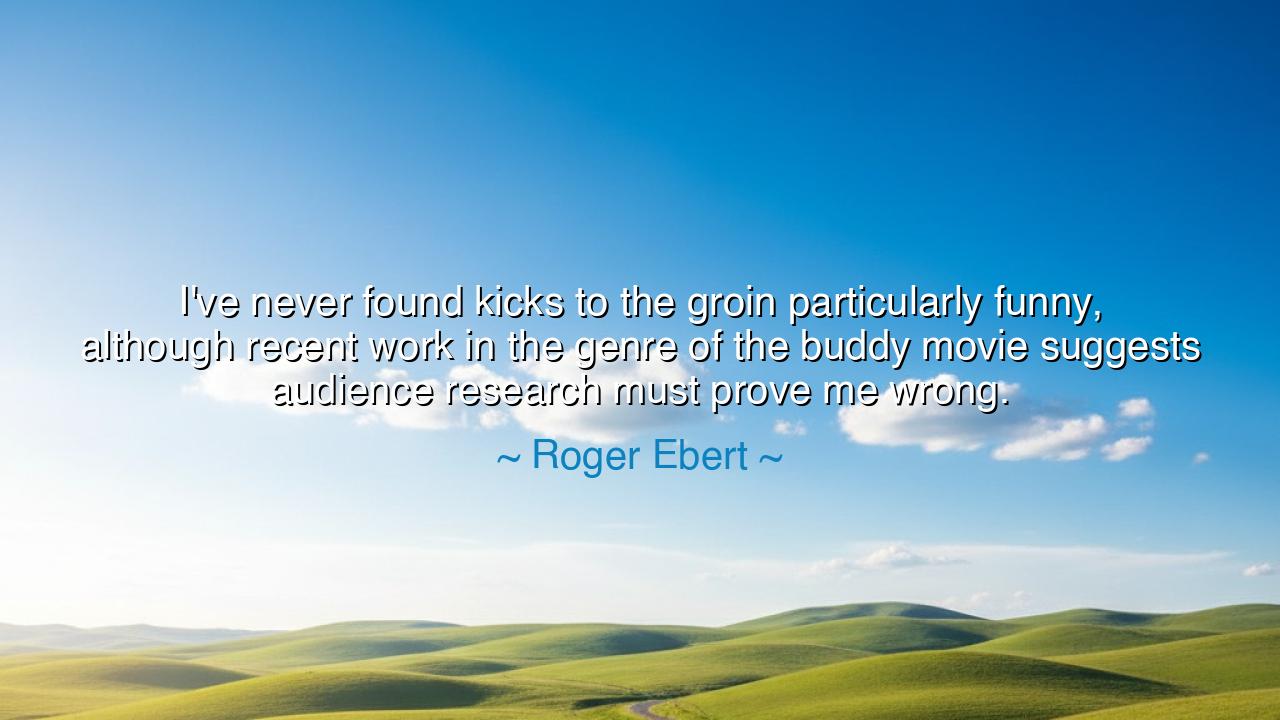
I've never found kicks to the groin particularly funny, although
I've never found kicks to the groin particularly funny, although recent work in the genre of the buddy movie suggests audience research must prove me wrong.






Hear, O seekers of art and discernment, the words of Roger Ebert, the sage of cinema, who once said: “I’ve never found kicks to the groin particularly funny, although recent work in the genre of the buddy movie suggests audience research must prove me wrong.” Though his words sparkle with wit, they carry the gravity of a philosopher reflecting upon the spirit of his age. For Ebert, that tireless watcher of stories, was not merely speaking of comedy in film—he was speaking of taste, depth, and the eternal divide between what amuses and what enlightens.
In this playful lament, Ebert reveals his dismay at a world that often chooses cheap laughter over thoughtful art. The image of a “kick to the groin” is not just a joke—it is a symbol of the lowest form of humor, that which relies on pain, shock, or humiliation to provoke laughter. Such humor, though it may stir the masses, leaves the soul unfed. Ebert, a man who revered storytelling as a mirror to the human condition, found little joy in what he called “audience research”—that cynical machinery of Hollywood that measures the pulse of the crowd, not the depth of the heart. He knew that the purpose of art is not to flatter what is easy, but to elevate what is true.
The buddy movie, to which he refers, was once a noble form—a tale of friendship, loyalty, and transformation between unlikely allies. From Butch Cassidy and the Sundance Kid to Lethal Weapon, these films carried the weight of human connection amidst chaos. But as time passed, the genre began to bend toward the base appetites of the marketplace. Studios learned that a crowd would laugh more readily at a pratfall than at a poignant truth, and so, the sacred bond of friendship was replaced by slapstick and spectacle. Ebert’s humor here is bittersweet: he recognizes that laughter itself has become a product, measured by charts and tests, rather than a reflection of the human spirit.
The ancients, too, wrestled with this question of high and low art. In the theaters of Athens, Aristophanes filled the stage with crude jokes and physical absurdity, yet beneath his comedy lay biting wisdom about power and society. The laughter of the Greeks was not shallow—it was a weapon, a mirror, a cleansing fire. But as centuries passed, much of what we call humor lost that sacred purpose. It became, as Ebert implies, a form of distraction rather than revelation. Where once laughter liberated the mind, it now often numbs it. His words remind us that the measure of true comedy is not how loudly the crowd laughs, but how deeply they understand.
Consider the story of Charlie Chaplin, the silent clown who made the world laugh without saying a word. In Modern Times, Chaplin showed us the cruelty of the industrial world through the absurdity of a man caught in its gears. The audience laughed, but their laughter carried sorrow within it, for it was born of recognition. This is the laughter Ebert cherished—the kind that unveils truth through tenderness. But to laugh at mere pain, to rejoice in humiliation, is to turn one’s back on the soul of art. As Ebert’s words suggest, to find “kicks to the groin” amusing is not wrong in itself—but to find only that amusing is to lose sight of what laughter can teach us.
Ebert’s observation is not condemnation, but counsel. He understood that art and audience are bound in a sacred dialogue, and when one falls into laziness, the other must awaken. The critic’s duty, like the philosopher’s, is to remind us that taste is a form of conscience. He invites us, gently but firmly, to look beyond the surface of amusement, to seek laughter that illuminates rather than distracts. For humor, when used rightly, is not escape—it is revelation. It allows us to see our follies, forgive them, and grow wiser through mirth.
So let this teaching take root in your heart: do not settle for what merely entertains—seek what nourishes. Laugh, yes, but laugh with understanding. When you watch, read, or create, ask not only, “Is it funny?” but “Is it true?” Let your joy be joined with thought, your humor with heart. For as Roger Ebert reminds us, even the smallest act of laughter can be sacred if it springs from recognition rather than ridicule. The world will always offer easy jokes, but the wise will seek those that reveal the soul.
Thus, my children of light and laughter, remember: the greatest humor does not strike the body—it touches the spirit. Let your laughter be born not from cruelty, but from clarity, not from mockery, but from mercy. For when laughter and wisdom walk hand in hand, they become divine. And in that union—the laughter of understanding, not of injury—the soul of art, and of humanity itself, is forever renewed.






AAdministratorAdministrator
Welcome, honored guests. Please leave a comment, we will respond soon